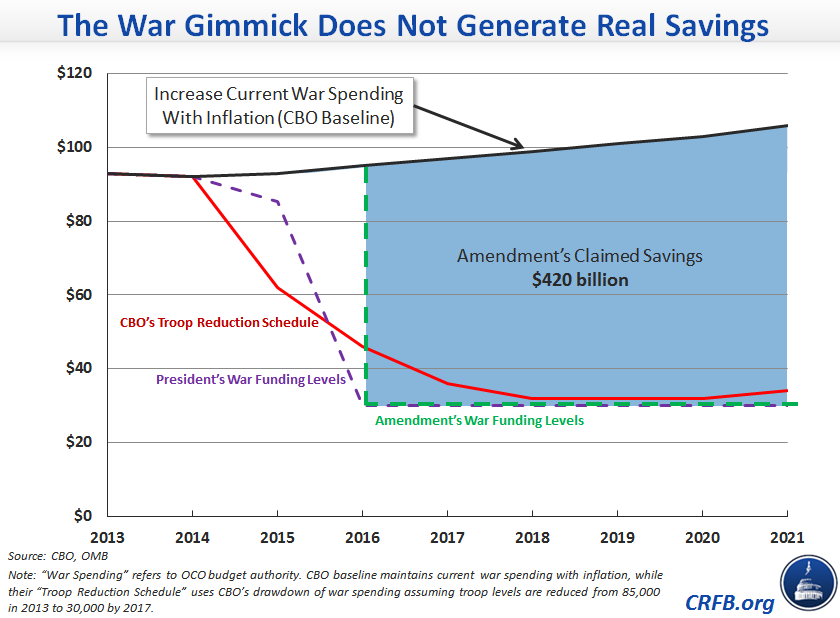Democratic SGR Offset Alternative Replaces One Gimmick With Another
Earlier today, we wrote that the the House Republican SGR bill would add to long-term deficits by using a timing gimmick to pay for permanent costs with temporary savings. It turns out, a Democratic alternative introduce by Rep. John Tierney (D-MA) would replace this gimmick with another – the war spending gimmick.
Specifically, the amendment would cap war spending for FY2016 through FY2021 at about $30 billion – which totals about $70 billion annually below the CBO baseline. Yet as we've explained before in our gimmicks paper, budget gimmicks chartbook, and various other blogs, these savings aren't real. By convention, CBO assumes uncapped discretionary spending grows with inflation; but there is already a drawdown underway and reducing spending down to already-planned spending levels represents a phony offset.
As far as budget gimmicks go, this one is arguably far worse than the House Republican amendment. That bill would at least not add to the debt until 2027, whereas the Democratic alternative will begin adding to the debt immediately. The savings outlined in the Democratic alternative are almost completely imaginary, measured against spending levels which in no way reflect our current course. Any modest spending reductions they might cause by reducing war spending on the margins will be tiny and uncertain.
CBO itself has said:
Placing caps on appropriations for overseas contingency operations that are below the amounts in CBO’s baseline would result in estimated savings relative to those baseline projections. Such savings, however, might simply reflect policy decisions that have already been made and that would be realized even without such funding constraints. Moreover, if future policymakers believed that national security required appropriations above the capped levels, they would almost certainly provide emergency appropriations that would not, under current law, be counted against the caps.
Others from across the political spectrum have agreed. Jim Horney of the Center on Budget and Policy Priorities has said that drawing down war spending does not represent real savings, and House Budget Committee Chairman Paul Ryan (R-WI) has said that "an honest budget cannot claim to save taxpayers' dollars by cutting spending that was not requested and will not be spent."
Finding offsets for the cost of replacing the SGR should be a great opportunity to make reforms to bend the health care cost curve rather than a burden to be avoided at all costs. Both of the main proposed offsets are gimmicky in their own ways. Instead, lawmakers should invest their energy in finding acceptable bipartisan reforms to make Medicare more efficient, cost-effective, and financially sound.
Update 3/14/14: In a floor speech yesterday, Finance Committee Chairman Ron Wyden (D-OR) proposed repealing SGR by either a gimmick reducing war spending or without being paid for. In a statement, CRFB President Maya MacGuiness criticized the three SGR plans – that of House Republicans, House Democrats, and Senate Democrats – saying "By putting the bill on our national credit card, or covering up the true costs, our leaders are only making the problem worse."


